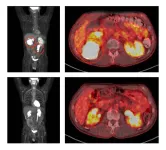(Press-News.org) The composition of the intestinal flora can predict the chances of developing serious infections such as pneumonia. Researchers from Amsterdam UMC and the University of Turku, Finland, followed more than 10,000 people for 6 years. More than 600 people who had less healthy intestinal flora developed a serious infection, with this leading in some cases to death. The results of the study are published today in The Lancet Microbe.
The 602 people who were hospitalised due to an infection showed at the start of the study that they had fewer butyrate-producing bacteria in their microbiome. Butyrate is a small fatty acid that is known to have a positive impact on the immune system of mice. It has also been seen before that people with serious infections have less of these bacteria. "But we didn't know whether the less healthy gut flora is due to the acute infection and its treatment or whether they have always had less of the butyrate-producing bacteria in their microbiome," says PhD student Bob Kullberg. "The study now answers this chicken-and-egg question."
The researchers wanted to know whether, just like in mice, butyrate also has a beneficial effect on the immune system in humans. The study analysed stool samples from more than 10,000 people (6,000 from the Finnish FINRISKI cohort and more than 4,000 Dutch participants from the HELIUS cohort). In the study, the researchers analysed 16 bacteria that make butyrate druing the the fermentation of dietary fiber. Humans can't digest fiber on their own, but these bacteria can. The 602 patients who were hospitalised during the 6-year follow-up study had significantly fewer of these butyrate-producing bacteria in their gut compared to the remaining people in the 2 cohorts.
"We saw that in people who have 10% more of those bacteria in their gut, the chance of getting an infection decreases by as much as 15 to 25%," says Kullberg. Thus, the microbiome is involved in infections outside the gut, such as lung and bladder infections. The analyses considered factors such as age, history of antibiotic use, and underlying diseases that influence gut microbiota composition and infection risk.
Follow-up research
Butyrate thus improves the defence against infections outside the intestines. This finding emphasises the importance of a healthy microbiome and opens doors to predicting the risk of a serious infection for each individual. But why one individual has more butyrate-producing bacteria than the other remains a question.
The question of whether something can be done to introduce these bacteria into the intestines is also still unanswered. "Follow-up research is needed to find out how we can increase the amount of butyrate with diet or probiotics, in order to prevent serious infections," says co-researcher and professor Joost Wiersinga.
END
Fewer good gut bacteria increase the risk of serious infection
2024-06-20
ELSE PRESS RELEASES FROM THIS DATE:
Sweat health monitor measures levels of disease markers
2024-06-20
PULLMAN, Wash. -- A wearable health monitor developed by Washington State University researchers can reliably measure levels of important biochemicals in sweat during physical exercise.
The 3D-printed monitor could someday provide a simple and non-invasive way to track health conditions and diagnose common diseases, such as diabetes, gout, kidney disease or heart disease.
Reporting in the journal, ACS Sensors, the researchers were able to accurately monitor the levels of volunteers’ glucose, lactate ...
Scientists devise algorithm to engineer improved enzymes
2024-06-20
Scientists have prototyped a new method for “rationally engineering” enzymes to deliver improved performance. They have devised an algorithm, which takes into account an enzyme’s evolutionary history, to flag where mutations could be introduced with a high likelihood of delivering functional improvements.
Their work – published today in leading journal Nature Communications – could have significant, wide-ranging impacts across a suite of industries, from food production to human ...
We may soon be able to detect cancer with AI
2024-06-20
A new paper in Biology Methods & Protocols, published by Oxford University Press, indicates that it may soon be possible for doctors to use artificial intelligence (AI) to detect and diagnose cancer in patients, allowing for earlier treatment. Cancer remains one of the most challenging human diseases, with over 19 million cases and 10 million deaths annually. The evolutionary nature of cancer makes it difficult to treat late-stage tumours.
Genetic information is encoded in DNA by patterns of the four bases—denoted by A, T, G and C—that make ...
Rate of cannabis use disorder during pregnancy increased over 20% after cannabis legalization in Canada
2024-06-20
In October 2018, Canada enacted the Cannabis Act in Canada (CAC), which legalised the non-medical use of cannabis. A new study has found that the rate of cannabis-related disorders diagnosed among pregnant women in the Canadian province of Québec increased by more than 20% after the enactment of the CAC, while rates for all other drug- and alcohol-related disorders remained stable. The study is published today in the scientific journal Addiction.
This study measured changes to the monthly rates of diagnosed cannabis-related disorders (CRDs) in the pregnant population in Québec. Since 2010 the monthly average number of CRDs has increased consistently, ...
Among cancer survivors, LGBTQ+ individuals report higher prevalence of chronic health conditions, disabilities, other limitations
2024-06-20
Bottom Line: Cancer survivors who identify as lesbian, gay, bisexual, transgender, queer, or anything other than straight and cisgender (LGBTQ+) experience more chronic health conditions, disabilities, and other physical and cognitive limitations than non-LGBTQ+ cancer survivors; however, the prevalence of most conditions was highest among transgender or gender non-conforming (TGNC) individuals.
Journal in Which the Study was Published: Cancer Epidemiology, Biomarkers & Prevention, a journal of ...
Improving crops with laser beams and 3D printing
2024-06-20
A demonstration of how new technologies can be used in 21st century crop breeding comes from just published research that combines Laser Scanning and 3D printing to create a detailed 3D model of a sugar beet plant. Taking the next step beyond having genetic information to guide intelligent breeding, the 3D plant models here capture the essential characteristics of the above-ground parts of the sugar beet plant and can be used for AI-assisted crop improvement pipelines. The sugar beet plant models are reproducible and fit for field use. All the research information, data, methodology, as well as the 3D printing files are freely ...
Government’s failure to fortify all flour and rice with sufficient folic acid will lead to avoidable birth defects, warns expert
2024-06-20
The UK government’s failure to fortify all flour and rice with the vitamin folic acid “will result in more deaths and birth defects every year that could have been prevented,” argues Professor Sir Nicholas Wald in The BMJ today.
He warns that the current government’s proposal to fortify only one type of flour (non-wholemeal wheat flour) at an inadequate level will prevent only about 20% of neural tube defects, much less than the approximate 80% that could be prevented with fully effective fortification.
“What the government has done is a useful ...
Walking brings huge benefits for low back pain, study finds
2024-06-20
Adults with a history of low back pain went nearly twice as long without a recurrence of their back pain if they walked regularly, a world-first study has found.
About 800 million people worldwide have low back pain, and it is a leading cause of disability and reduced quality of life.
Repeated episodes of low back pain are also very common, with seven in 10 people who recover from an episode going on to have a recurrence within a year.
Current best practice for back pain management and prevention suggests the combination of ...
Study finds one copy of protective genetic variant helps stave off early-onset Alzheimer’s disease
2024-06-19
KEY TAKEAWAYS
An international team, including researchers from Mass General Brigham, has been searching for protective genetic variants in a family that includes more than 1,000 individuals who are genetically predisposed to develop early onset Alzheimer’s disease in their 40s.
Previously, the researchers identified the “Christchurch variant” as potentially protective against Alzheimer’s based on one family member who had two copies of this variant and was expected to develop dementia in her ...
Combination targeted treatment produces lasting remissions in people with resistant aggressive B-cell lymphoma
2024-06-19
Embargoed for Release
Wednesday, June 19, 2024
5:00 p.m. ET Contact: NCI Press Office
240-760-6600
NCIPressOfficers@nih.gov
NOTE: A virtual briefing is scheduled for Tuesday, June 18, 2024, at 1:00 p.m. ET. Details below.
Researchers at the National Institutes of Health (NIH) have developed a non-chemotherapy treatment regimen that is achieving full remissions for some people with aggressive B-cell lymphoma that has come back or is no longer responding to standard treatments. The five-drug combination targets multiple molecular pathways that diffuse large B-cell lymphoma (DLBCL) tumors use to survive.
In ...



